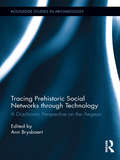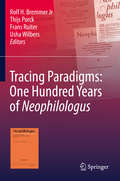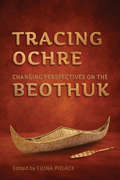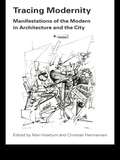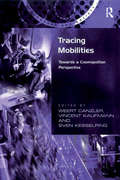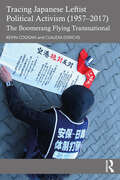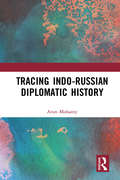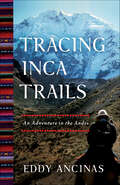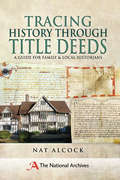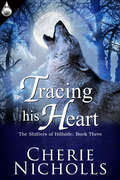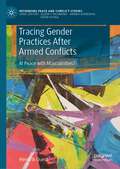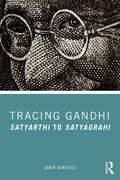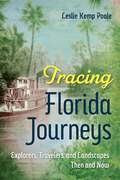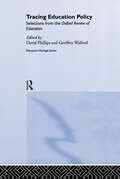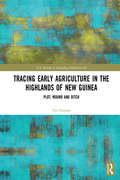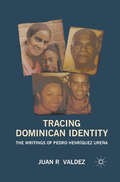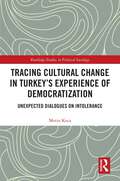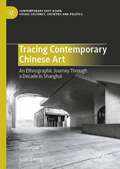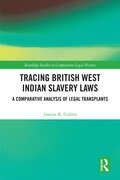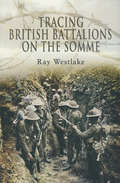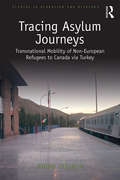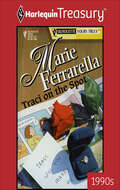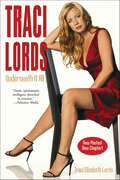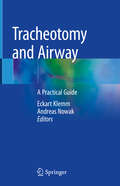- Table View
- List View
Tracing Prehistoric Social Networks through Technology: A Diachronic Perspective on the Aegean (Routledge Studies in Archaeology)
by Ann BrysbaertThis volume investigates smaller and larger networks of contacts within and across the Aegean and nearby regions, covering periods from the Neolithic until Classical times (6000–323 BC). It explores the world of technologies, crafts and archaeological 'left-overs' in order to place social and technological networks in their larger economic and political contexts. By investigating ways of production, transport/distribution, and consumption, this book covers a chronologically large period in order to expand our understanding of wider cultural developments inside the geographical boundaries of the Aegean and its regions of contact in the east Mediterranean. This book brings together scholars’ expertise in a variety of different fields ranging from historical archaeology (using textual evidence), archaeometry, geoarchaeology, experimental work, archaeobotany, and archaeozoology. Chapters in this volume study and contextualize archaeological remains and explore networks of crafts-people, craft traditions, or people who employed various technologies to survive. Central questions in this context are how and why traditions, techniques, and technologies change or remain stable, or where and why cross-cultural boundaries developed and disintegrated.
Tracing Paradigms: One Hundred Years of Neophilologus
by Rolf H. Bremmer Jr Thijs Porck Frans Ruiter Usha WilbersThis volume brings together a selection of pivotal articles published in the hundred years since the launch of the journal Neophilologus. Each article is accompanied by an up-to-date commentary written by former and current editors of the journal. The commentaries position the articles within the history of the journal in particular and within the field of Modern Language Studies in general. As such, this book not only outlines the history of a scholarly journal, but also the history of an entire field. Over the course of its first one hundred years, 1916 to 2016, Neophilologus: An International Journal of Modern and Mediaeval Language and Literature has developed from a modest quarterly set up by a group of young and ambitious Dutch professors as a platform for their own publications to one of the leading international journals in Modern Language Studies. Although Neophilologus has remained broad-scope, multilingual and multidisciplinary, it has witnessed dramatic changes in its long-standing history: paradigm shifts, the rise and fall of literary theories, methods and sub-disciplines, as has the field of Modern Language Studies itself.
Tracing Ochre: Changing Perspectives on the Beothuk
by Fiona PolackThe supposed extinction of the Indigenous Beothuk people of Newfoundland in the early nineteenth century is a foundational moment in Canadian history. Increasingly under scrutiny, non-Indigenous perceptions of the Beothuk have had especially dire and far-reaching ramifications for contemporary Indigenous people in Newfoundland and Labrador. Tracing Ochre reassesses popular beliefs about the Beothuk. Placing the group in global context, Fiona Polack and a diverse collection of contributors juxtapose the history of the Beothuk with the experiences of other Indigenous peoples outside of Canada, including those living in former British colonies as diverse as Tasmania, South Africa, and the islands of the Caribbean. Featuring contributions of Indigenous and non-Indigenous thinkers from a wide range of scholarly and community backgrounds, Tracing Ochre aims to definitively shift established perceptions of a people who were among the first to confront European colonialism in North America.
Tracing Modernity: Manifestations of the Modern in Architecture and the City
by Mari Hvattum Christian HermansenFirst published in 2004. Routledge is an imprint of Taylor & Francis, an informa company.
Tracing Mobilities: Towards a Cosmopolitan Perspective
by Weert CanzlerMobility is a basic principle of modernity besides others like individuality, rationality, equality and globality. Taking its cue from this concept, this book presents a movement that begins with the macro-social transformations linked to mobility and ends with empirical discussions on the new forms of mobility and their implications for everyday life. The book opens with a study of the social changes unique to the second age of modernity, with contributions from Ulrich Beck, John Urry, Wolfgang Bonss and Sven Kesselring. It continues with a discussion of the implications of these changes for sociological research. Authors such as Vincent Kaufmann, Weert Canzler, Norbert Schneider, Beate Collet, Ruth Limmer and Gerlinde Vogl focus on a series of field examinations, both qualitative and quantitative, of emerging mobilities. The book is a foray into the exciting new field of interdisciplinary mobility research informed by theoretical reflection and empirical investigation.
Tracing Killer Evidence (Dakota K-9 Unit)
by Jodie BaileyA string of unsolved kidnappings… A K-9 team out for justice… Forensic artist Isabella Whitmore narrowly escapes an abduction attempt in the Dakota Badlands, only to find herself targeted by a mysterious assailant. With the help of FBI special agent Liam Barringer and his K-9, Guthrie, Isabella must uncover the identity of her would-be murderer. Is the culprit the elusive kidnapper turned serial killer who&’s targeting Isabella because she matches his victim profile? Or has her secret past finally caught up with her? As the attacks escalate, Isabella and Liam must find the truth and stop the danger before it&’s too late.From Love Inspired Suspense: Courage. Danger. Faith.Dakota K-9 Unit Book 1: Chasing a Kidnapper by Laura ScottBook 2: Deadly Badlands Pursuit by Sharee StoverBook 3: Standing Watch by Terri ReedBook 4: Cold Case Peril by Maggie K. BlackBook 5: Tracing Killer Evidence by Jodie BaileyBook 6: Threat of Revenge by Jessica R. PatchBook 7: Double Protection Duty by Sharon DunnBook 8: Final Showdown by Valerie Hansen
Tracing Japanese Leftist Political Activism (1957 – 2017): The Boomerang Flying Transnational
by Claudia Derichs Kevin CooganTracing Japanese Leftist Political Activism (1957–2017) tells the story of the Japanese Red Army (JRA), a militant left-wing group founded in 1971 which was involved in numerous terrorist attacks. It traces the origins of the group in the Japanese New Left in the 1960s and looks at Red Army groups of the early 1970s in Japan, such as the Red Army Faction, and the United Red Army which became infamous for murdering its own members. The book also examines the JRA's trans- and international links with other militant groups including the Popular Front for the Liberation of Palestine, as well as the networks of intellectuals and fellow activists who supported them. This book will be of great interest to students and scholars of terrorism, radicalism, and Japanese social history.
Tracing Indo-Russian Diplomatic History
by Arun MohantyThe India-Russia relationship has been through a number of phases since its formal establishment in April 1947. Prime Minister Nehru’s strategic vision led him to seek diplomatic relations with the Soviet Union (USSR) even before India attained Independence. The enthusiastic Soviet response launched a relationship which has had some unique features in the past seventy-two years. The detailed history of the India-Russia relationship presented in this volume highlights the continued relevance of many of the factors that led to a close India-Russia bonding, even while identifying the slip roads into which the partnership has occasionally drifted. Politics evolves continuously, but geography remains constant. The India-Russia relationship has a mutually-recognized geopolitical logic. They have common concerns in the shared neighbourhood of West and Central Asia. Like India, Russia has had a complex relationship with China. In the quest for a multi-polar world, in which every pole seeks to protect its core interests and promote its aspirations, Russia and India, as this comprehensive volume notes, will remain staunch partners in the foreseeable future. Please note: Taylor & Francis does not sell or distribute the Hardback in India, Pakistan, Nepal, Bhutan, Bangladesh and Sri Lanka
Tracing Inca Trails: An Adventure in the Andes
by Eddy AncinasEddy Ancinas and her friends set out on on a seven-day horseback trip that takes them over Peru’s rugged terrain to 20,574-foot-high Mt. Salcantay, along an ancient Inca route, and then down into the jungle. During this journey, these fifty-something travelers are challenged by events they never imagined possible: a fall from a horse that results in serious injuries, a train strike that leaves them stranded in a remote village, an eight-hour trek on railroad tracks along the Urubamba River, and a moonlight ride in the back of a truck with questionable brakes on a dirt road over a 14,000-foot pass, among others. It is a journey full of mishaps—and yet Eddy is enchanted by the culture and places she experiences along the way. As she and her fellow travelers explore Lima, Cusco, and the markets, villages, and ruins of the Urubamba Valley, they are deeply touched by the people they meet, fascinated by the clues to an ancient civilization they learn to respect and admire, and enthralled by the spectacular setting where it all takes place: Andean Peru.
Tracing History Through Title Deeds: A Guide for Family & Local Historians
by Nat AlcockProperty title deeds are perhaps the most numerous sources of historical evidence but also one of the most neglected. While the information any one deed contains can often be reduced to a few lines, it can be of critical importance for family and local historians. Nat Alcock's handbook aims to help the growing army of enthusiastic researchers to use the evidence of these documents, without burying them in legal technicalities. It also reveals how fascinating and rewarding they can be once their history, language and purpose are understood. A sequence of concise, accessible chapters explains why they are so useful, where they can be found and how the evidence they provide can be extracted and applied. Family historians will find they reveal family, social and financial relationships and local historians can discover from them so much about land ownership, field and place names, the history of buildings and the expansion of towns and cities. They also bring our ancestors into view in the fullness of life, not just at birth, marriage and death, and provide more rounded pictures of the members of a family tree.
Tracing His Heart
by Cherie NichollsRe-Release: (2013, Under a Moonlit Night, Liquid Silver Books)A heartbroken shifter and an exiled Domme. Watch the sparks fly and passion ignite when these two lone wolves meet! Romance author Cherie Nicholls is pleased to present Tracing His Heart, Book 3 of her hot romance series, The Shifters of Hillside.Carter Jones, known as Jones to his friends, lost part of his soul a long time ago. He had to make a choice between his pack and his heart, a choice that has haunted him and his wolf for years.Rhea Gracefield, Domme, business woman, and lone wolf, was forced out of her pack when the wolf she loved told their secret.What happens when Jones finds his way into the Domme's Domain?Content Notes: Hot, D/s Elements, Lifestyle, Spanking, Short FF scene, Paranormal, Contemporary, Shifters, Wolves, BBW, BDSM
Tracing Gender Practices After Armed Conflicts: At Peace with Masculinities? (Rethinking Peace and Conflict Studies)
by Hendrik QuestThis book offers a unique perspective on changing gender practices in post-conflict societies, looking at when and how masculinities change after armed conflicts. Building on original research data from Liberia, chapters look at the pathways of change in societal discourses, security sector institutions, and at the level of formatter combatants. Scrutinising the potential of peacebuilding for making conflict-related masculinities change after armed conflicts, the book develops a theoretical model that helps to understand both how violence-centred masculinities change after armed conflicts, and why profound changes of violent gender practices occur only rarely. What this book hopes to show is that masculinities can and do change after armed conflicts. Illuminating the intricate interrelationship between gendered practices within societal discourses, security sector institutions, and at the individual level in post-conflict societies, this book constitutes an invitation to rethinking our understanding of peacebuilding practices and their interconnectedness with gender, violence, and peace.
Tracing Gandhi: Satyarthi to Satyagrahi
by Samir BanerjeeThis book traces the journey of Mahatma Gandhi, from being a simple and truth-seeking human being, a satyarthi, to a committed, conscious and social human being, a satyagrahi. It specifically looks at this critical transformation during the time Gandhi was in South Africa. The central argument of the book is that Gandhi evolved from being a satyarthi to a satyagrahi in South Africa. Subsequently in India, he consolidated his orientation with an emphasis on praxis, by developing his ideas as instruments for social and individual struggles. Marked by a series of events, this period was an intense quest of self-realization and understanding, and shows his journey from being Mohandas Karamchand Gandhi to being Mahatma Gandhi. The book discusses various elements of Gandhian thought and praxis – morality, wisdom, non-violence, truth, social justice, dharma, trusteeship, education, sarvodaya, Hind Swaraj, swadeshi, and social service – and interprets the relevance of Gandhi’s thought in the modern world by highlighting its unique significance for social transformation and change. Lucid and accessible, the book will be useful to scholars and researchers of Gandhi studies, Indian political thought, modern Indian history, and political studies.
Tracing Florida Journeys: Explorers, Travelers, and Landscapes Then and Now (Co-published with Florida Humanities)
by Leslie Kemp PooleDiscover Florida’s unique places across time through writings from history How has Florida’s land changed across five centuries? What has stayed the same, and what remains only in memory? In Tracing Florida Journeys, Leslie Poole delves into the stories of well-known explorers and travelers who came to the peninsula and wrote about their experiences, looking at their words and the paths they took from the perspective of today. In these pages, John Muir and Harriet Beecher Stowe write about their visits to Florida, reflecting their expectations of a place that was touted to be “paradise.” John James Audubon finds riches of bird life in the Keys. Zora Neale Hurston travels to turpentine camps and sawmills documenting the stories and music of workers and residents. Jonathan Dickinson and Stephen Crane recount shipwrecks along a sparsely populated coastline. Members of Hernando de Soto’s violent 1539 expedition of conquest describe their struggles with dense swamps, forests, and rivers, and resistance from the Native people they exploited. Using journals and articles by these and other authors that date back to the early European exploration of the region, Poole retraces their steps. The land they write about is often hard to imagine in today’s Florida, a top destination for tourists filled with almost 22 million residents. These stories show the evolving history of the state and the richness of its natural resources. Poole’s comparisons also point to the people who have been displaced and the ecosystems that have been dramatically altered by exploration and development. Highlighting the Florida that was and the Florida that exists now, Poole brings together historical research, interviews with experts, and her personal experiences to tell a revealing story of the state’s natural history. Funding for this publication was provided through a grant from Florida Humanities with funds from the National Endowment for the Humanities. Any views, findings, conclusions or recommendations expressed in this publication do not necessarily represent those of Florida Humanities or the National Endowment for the Humanities.
Tracing Education Policy: Selections from the Oxford Review of Education (Education Heritage)
by David Phillips Geoffrey WalfordThis book brings together key articles that trace the development of British education policy since 1975 and provides a valuable route map to developments within education policy during this period. It includes twenty-six seminal articles from the Oxford Review of Education written by many of the leading authors in the field and covering issues and topics with a wide significance beyond Britain. In one, easy-to-access place, this authoritative reference book provides a collection of articles that have made an important impact on policy studies and cover a broad range of significant policy issues, including: equality in education school effectiveness special educational needs school choice fourteen to nineteen education the structure of the educational system. The book has been compiled by the current editors of the journal to show the development of the field, and their specially written introduction contextualises the selection and introduces students to the main issues and current thinking in the field.
Tracing Early Agriculture in the Highlands of New Guinea: Plot, Mound and Ditch (UCL Institute of Archaeology Publications)
by Tim DenhamIn this book, historical narratives chart how people created forms of agriculture in the highlands of New Guinea and how these practices were transformed through time. The intention is twofold: to clearly establish New Guinea as a region of early agricultural development and plant domestication; and, to develop a contingent, practice-based interpretation of early agriculture that has broader application to other regions of the world. The multi-disciplinary record from the highlands has the potential to challenge and change long held assumptions regarding early agriculture globally, which are usually based on domestication. Early agriculture in the highlands is charted by an exposition of the practices of plant exploitation and cultivation. Practices are ontologically prior because they ultimately produce the phenotypic and genotypic changes in plant species characterised as domestication, as well as the social and environmental transformations associated with agriculture. They are also methodologically prior because they emplace plants in specific historico-geographic contexts.
Tracing Dominican Identity
by Juan R. ValdezThe author analyzes and discusses the socio-historical meanings and implications of Pedro Henríquez Ureña's (1884-1946) writings on language. This important twentieth century Latin American intellectual is an unavoidable reference in Hispanic Linguistics and Cultural Studies.
Tracing Cultural Change in Turkey's Experience of Democratization: Unexpected Dialogues on Intolerance (Routledge Studies in Political Sociology)
by Metin KocaDoes democracy require an agreement on specific foundational values? Bringing insights from Turkey to the study of democratization, this book argues that democracy may rather be about acknowledging the disagreement over values before negotiating over other concerns, such as rights, freedoms, capabilities and duties. It explores this idea by examining three landscapes of culture in Turkey, which have been the subjects of persistent stories regarding the unequal relationship between the self and the other. These include LGBT visibility and the entertainment sector, women and clothing, and Alevism and funerals. Through these case studies, the book analyses the remaking of (in)tolerance through the integration of LGBT representations into broader political struggles over values, the assertion of women’s rights and freedoms from traditional values surrounding dress, and the conflict between essentialist intolerance and the syncretic traditions of Alevi identity. Bringing these landscapes together with the surrounding cultural tensions in Turkey and the West, Tracing Cultural Change in Turkey's Experience of Democratization will be a valuable resource for students and scholars of Middle Eastern studies and politics, gender studies and cultural studies.
Tracing Contemporary Chinese Art: An Ethnographic Journey Through a Decade in Shanghai (Contemporary East Asian Visual Cultures, Societies and Politics)
by Isaac LeungThis book explores the author's ten-year ethnographic journey in different locations in Shanghai. His immersion in China’s art world is grounded in a topology of places and new ways of writing and deploying history today. The ethnographic approaches to experiencing, analysing and representing space offer a critical tool to explore a different version of realism invisible in the nominal art and art history paradigms. As the market and institutional norms are still being defined, this book also documents and analyses how individuals have strived to negotiate boundaries in the art world and thus create unique selfhood. Instead of conventional methods of periodisation and stylistic analysis, this book presents a historiographic strategy emphasising the philosophical significance of spatial realism to offer insights into history, subjectivities and political institutions.
Tracing British West Indian Slavery Laws: A Comparative Analysis of Legal Transplants (Routledge Studies in Comparative Legal History)
by Justine K. CollinsThis book provides a legal historical insight into colonial laws on enslavement and the plantation system in the British West Indies. The volume is a work of comparative legal history of the English-Speaking Caribbean which concentrates on how the laws of England served to catalyse the slavery laws and also legislation pertaining to post-emancipation societies. The book illustrates how these “borrowed” laws from England not only developed colonial slavery laws within the English speaking Caribbean but also inspired the slavery codes of a number of North American plantation systems. The cusp of the work focuses on the interconnectivities among the English-speaking slave holding Atlantic and how persons, free and unfree, moved throughout the system and brought laws with them which greatly affected the various enslaved societies. The book will be essential reading for students and researchers interested in colonial slavery, Caribbean Studies, Black and Atlantic history.
Tracing British Battalions on the Somme
by Ray WestlakeAlthough seventy-eight years have passed since the Battle of the Somme was fought, interest in this, the bloodiest battle of the First World War, has never waned. Ray Westlake has collated all the information so painstakingly gathered, to produce a comprehensive compendium of the exact movements of every battalion involved in the battle. This book is invaluable not only to researchers but to all those visiting the battlefield and anxious to trace the movements of their forbears.
Tracing Asylum Journeys: Transnational Mobility of Non-European Refugees to Canada via Turkey (Studies in Migration and Diaspora)
by Ugur YildizThis book explores the asylum journey of non-European asylum applicants who seek asylum in Turkey before resettling in Canada with the aid of the Canadian government’s assisted resettlement programme. Based on ethnographic research among Syrian, Afghan, Eritrean, Ethiopian, Iraqi, Iranian, Somali, Sudanese and Congolese nationals it considers the interactions of asylum seekers with both UNHCR’s refugee status determination and Canada’s refugee resettlement programme. With attention to the practices of migrants, the author shows how the asylum journey contains both mobility and stasis and constitutes a micro-political image of the fluidity and relativity of attributed identities and labels on the part of state migration systems. A multi-sited ethnography that shows how the migration journey is linked to the production and reproduction of knowledge, as well as the diffusion of produced knowledge among past, present, and future asylum seekers who form trans-local social networks in the course of their route, in Turkey, and in Canada. Tracing Asylum Journeys will appeal to sociologists and political scientists with interests in migration and transnational studies, and refugee and asylum settlement.
Traci on the Spot (Yours Truly)
by Marie FerrarellaTraci Richardson finally finds that special someone-and now she's really on the spot!Everyone tell me I should be happy now that Daniel has proposed. He has a good job, he's nice looking and he treats me well. Yep, he's darn near perfect-or so everyone keeps telling me. So why can't I just say yes?And now, enter Morgan. The last guy I ever thought I'd fall for. So why am I suddenly willing to ditch my one-and maybe only-chance at matrimony for one night in his arms?
Traci Lords: Underneath It All
by Traci Elizabeth LordsThe moving, gripping, and tell–all autobiography of Traci Elizabeth Lords, a former child porn queen, electronica maven, and cult movie and TV star.At 14, Nora Kuzma ran away from home and ended up on the dirty streets of Hollywood. She fell in with a fast crowd, and her dreams of modelling soon landed her a spectacular centrefold in Penthouse Magazine, where at 15 she became internationally known as TRACI LORDS. From there she appeared in numerous adult films and magazines, denying her past and battling a deep addiction to cocaine and men. Three years later she got out. This is her memoir–a tale of loss, redemption, and ultimate survival as Traci Elizabeth Lords takes you into her secretive past, faces her demons, and shares her extraordinary journey of personal growth.
Tracheotomy and Airway: A Practical Guide
by Eckart Klemm Andreas NowakIn dem Kompendium wird die sachgerechte Durchführung aller Varianten der Tracheotomie beschrieben. Im Mittelpunkt der interdisziplinären Darstellung stehen insbesondere die Analyse schwerer Früh- und Spätkomplikationen, ihre Vermeidung und ihre Therapie. Auch die logopädische Behandlung sowie neue Aspekte des Airway-Managements werden berücksichtigt.
